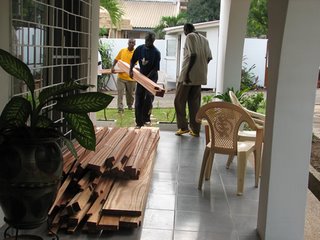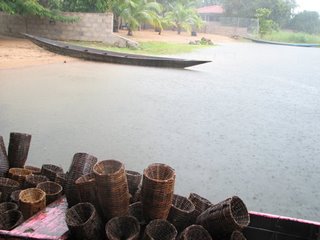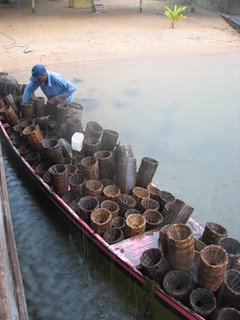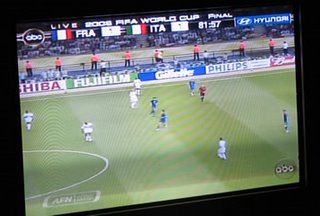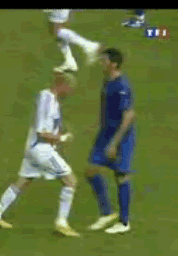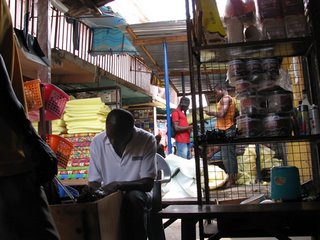
The winding alleys and cramped spaces of the tiny shops are the heart of Accra's construction supply industry. The carpenter is well known, and the shopkeepers call to him by name. They bargain at length, but he knows all the prices in advance.
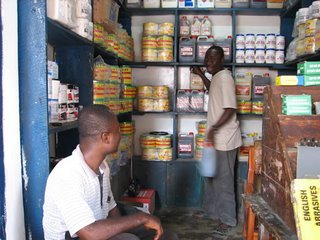
Each small shop specializes in something. Paint, hand tools, tiles, cement. Most are family run, open six days a week.
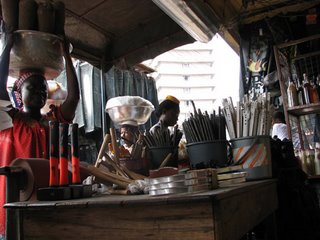
Nails are sold from big buckets, by the pound. The same shop offers hand tools, and coke bottles filled with carpenter's glue or other more mysterious lacquers and varnishes. A woman in her sixties, hair neatly pulled back in a bun, lips painted an astonishing lavendar, eyes darkly shaded, stands erect on a box behind the counter, high above her wares, seeing everything, seeing me, feigning indifference, yet barking instructions for a chair to be brought. Hospitality. The stranger, escorted by their friend the carpenter, sits and observes.

Negotiations are brisk and vibrant, yet full of humor. Even without understanding Twi, one can imagine each stage. A young clerk places a foot square of heavy paper from a used cement bag onto a scale, piles on first the 3-inch, then in turn the 2-inch and others of sizes deemed essential by my guide. Each is weighed precisely. My guide nods assent. She adds a few more as a gift, then folds each up into a neat packet, sealed with a nail inserted like a hairpin.

The owner's daughter deftly raises to her head our load of nails, gallons of liquids, a few brushes, and a stack of sand paper, then follows us several blocks to our car. She is incredibly strong.
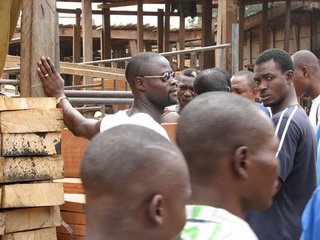
A crowd surrounds the car even before it rolls to a stop, prying open the doors, imploring the occupants to do business, pushing back their competitors with angry shouts, crying out in anguish as the carpenter selects one but not others to start the negotiations.
A contingent follows the carpenter around, arguing, cajoling, pleading, looking for just the right planks at just the right price. Several complain bitterly to me. "Your carpenter is causing trouble," they cry. "He negotiates with one, and then another, and he makes this one fight with that one." I reply, "I should sack (dismiss) him." They nod, "Yes, you must sack him."
I will not sack him. He gets good prices, drives a hard bargain, and then does excellent work with the things he buys in my behalf.
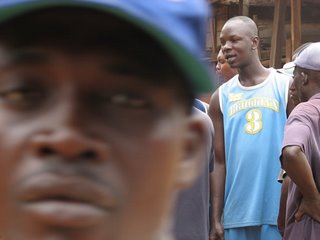
"What are you doing?!" one man demands. "No pictures here without payment!!" But I have friends in the market. I have purchased here before, and they know my bag contains the money. They intercede in my behalf. I take my pictures.
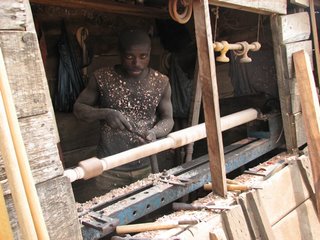
While the carpenter negotiates for boards, we pause in the lathe section. The operator turns out dozens of posts and castors each hour. I will not be buying his handiwork today, but he graciously agrees to a picture in return for a small gift of cash.
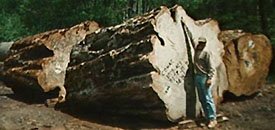
Some of the wood is called "cedar" or "red wood". Perhaps we know it as "bubinga" or "African rosewood." A single piece of 2x12 inch, 8 feet in length, runs about 125,000 cedis (9200 = $1). Logs are reported to be huge.
Four men approach me with earnest expressions and inquire in pidgen, "Escus me sah, we de mehk wehjah. Na oos kuntri yu cumoht?" (Excuse me sir, we are making wager. It is which country that you come out?) I answer, "American." One grabs 20,000 cedis from the hand of another, and dances off with glee. Some thought I was German. Others guessed British.

Huge men carry stacks of boards as if they are matchsticks, dropping them at the feet of the sawmiller. More negotiations and specifications, these more amiable. Paper and pen. Some will be shelves. Others will be ripped into battens for tacking screen into windows. Others will become 2x2's for framing and support.
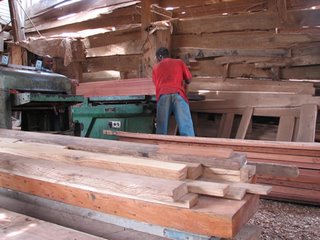
The first crew squares the edges of each board. The second planes the flat parts smooth. The third uses a circular table saw to cut the various sizes. They move fast and efficiently, and would surely glisten with sweat if they were not at the same moment coated with fine sawdust. They wear masks of various styles. Nothing protects their ears from the constant din. Conversation is in brief shouts.
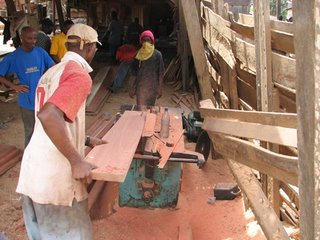
No safety goggles. Hands precariously close to the blades. But procedures are in place. Hand signals indicate when machinery are to be turned on or off. "Agoo" means "move out of the way."
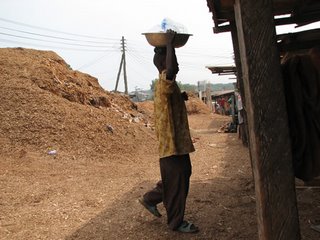
Huge piles of sawdust surround all the workspaces. They'll later be bagged and then sold from gardening shops.
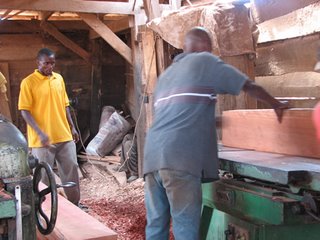
I ask permission, and snap lots of pictures. I'll print these, then send Moses back next week with copies to distribute. If I ever visit the timber market again, I'll be a hero, the man who promised pictures and then really did deliver them.
